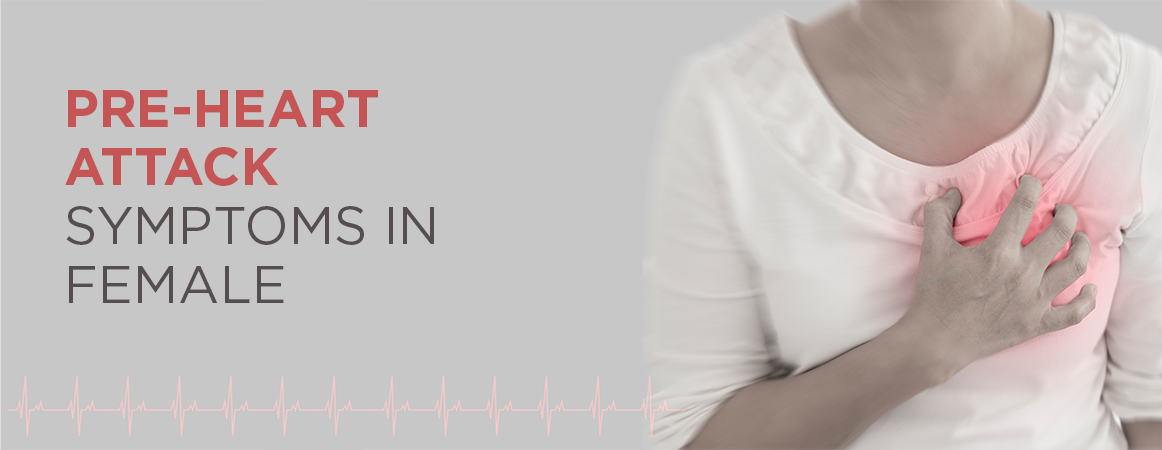Pre-Heart Attack Symptoms in Female
There is a beginning of heart attacks. The occurrence of these warning indicators, sometimes known as “pre-heart attack symptoms,” might occur days or even weeks before the actual incident. While both sexes experience the same general warning signs, some specific symptoms could be more prevalent in women.
Any of these typical symptoms could be present in a person. They may be mild or intermittent when they first appear. The signs and discomfort worsen over time. Continually monitor your heart rate and remain vigilant.
Pre-Heart Attack Symptoms in Female
Women may be less inclined to seek prompt medical attention that could avoid heart damage because they may experience particular heart attack symptoms.
- Men may have pain and numbness in their left arm or side of their chest. These symptoms may manifest on the right side in females.
- Women may feel exhausted, lightheaded, or queasy as well as experience unexplainable weariness.
- They may experience jaw pain that rises from their upper back.
- May mistakenly believe they have the flu, heartburn, or an ulcer when they experience stomach pain.
Heart Disease Risk Factors For Women
Women and men are both affected by a number of the classic risk factors for coronary artery disease, including excessive cholesterol, high blood pressure, and obesity. However, other factors may contribute more to the onset of heart disease in females. These include:
Family History of Heart Disease: This seems to be more of a risk factor for women than for men.
Inflammatory Conditions: Both men and women may have an increased risk of developing heart disease as a result of rheumatoid arthritis, lupus, and other inflammatory diseases.
Diabetes: Compared to males with diabetes, women have a higher risk of developing heart disease.
Inactivity: Cardiovascular disease is significantly increased by inactivity.
Menopause: Following menopause, low estrogen levels raise the risk of illness in smaller blood arteries.
Depression and Mental Stress: Women’s hearts are more susceptible to stress and depression than men’s. Maintaining a healthy lifestyle and adhering to treatment recommendations for various medical disorders may be challenging for someone who is depressed.
Smoking: Compared to men, women are more at risk for heart disease from smoking.
Pregnancy Complications: Diabetes or high blood pressure during pregnancy can raise the mother’s long-term chance of developing these conditions.
Book an appointment with the best cardiologist in Karachi at Memon Medical Institute Hospital, and get a routine heart check-up.
Signs And Symptoms of a Heart Attack
The most typical heart attack symptom in both men and women is some form of persistent or intermittent chest pain, pressure, or discomfort.
However, particularly in women, chest pain is not necessarily the most pronounced or even the most severe symptom. Heart attack pain is frequently described by women as being tight or pressured.
In contrast to men, women are more prone to experience heart attack symptoms like:
- Shortness of breath
- Pain in one or both arms
- Nausea or vomiting
- Sweating
- Lightheadedness or dizziness
- Unusual exhaustion
- Pain in the upper back, upper abdomen, neck, shoulder, or jaw
- Indigestion
These signs and symptoms might not be as obvious as the severe chest discomfort that is frequently connected to heart attacks. This may be due to small vessel heart disease, also known as coronary microvascular disease, a condition in which women are more likely than males to have blockages not just in their main arteries but also in the smaller ones that feed blood to the heart.
Women typically experience symptoms more frequently during rest or even sleep compared to males. Women’s heart attack symptoms may be exacerbated by emotional stress.
Symptoms of Heart Failure Getting Worse
The simplest sign that your heart failure is worsening is that you are becoming less and less active. Heart failure is a persistent, chronic ailment. However, you can always work with your doctor to manage the disease’s progression and in some cases, even treat the symptoms.
Have frequent heart exams since early detection of heart disease is essential for a healthy and long life. MMI Hospital has a cardiac center in Karachi. The best and most skilled cardiac surgeons in Karachi can be found right here.


